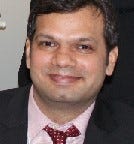Quantum Computing — Is this the future of technology?
In the revolutionary world of disruptive technologies, Quantum Computing (QC) is definitely something which cannot be missed.
Basics of Quantum Computing
The conventional computing world is binary consisting of 0’s and 1’s (Bits). Everything from our emails, tweets and videos contains long strings of these binary digits.
Traditional computers uses bits (read switch) which are either on (represented by 1) or off (represented by 0), though this works great but does not necessarily reflect the reality of our universe.
In real world things are not just on & off but uncertain, this is a problem with computers today as they can’t deal with uncertainty.
Therefore physicists have developed — quantum mechanics, which works at the atomic level creating effects for macroscopic world handling uncertainty — enter Quantum Computing.
Instead of bits, Quantum Computers uses QUBITS (quantam bits), which are subatomic particles (electrons or photons).
Quantum computing harnesses the unique ability of subatomic particles which allows them to exist in more than one state.
Qubits can provide way higher processing power than the same number of bits based on certain properties specific to QC.
Quantum computing uses Qubits as the basic unit of information which works on two properties — superposition and entanglement.
Superposition
Ordinary computers works with binary digits and can only have one value at a time — either 1 or 0 whereas qubits can represent multiple combinations of 1 and 0 at the same time. Superposition is the ability to put qubits simultaneously in multiple states.
Physicists manipulate qubits to keep them in superposition by using precision laser or microwave beams. This is why quantum computers are shielded electromagnetically and cooled down to almost absolute zero to avoid any outside disruption.
Example : a quantum computer with several qubits in superposition can crunch through a vast number of potential outcomes simultaneously.
Entanglement
Entanglement generate PAIRS of qubits wherein both members of a pair can exist in a single quantum state. In other words, qubit pairs are “entangled” meaning if there is a change in one pair the other pair changes in a preditable way instantaneously.
Example : due to entanglement, adding extra qubits to a quantum machine produces an exponential increase in its processing power.
Quantum Computing — Looking back in time…
1982 : Richard Feynman observed that classical computers cannot simulate the evolution of quantum systems in an efficient way and proposed a basic quantum computer model.
1985 : David Deutsch created a blueprint of a “universal quantum computer”
1994 : Peter Shor developed an algorithm enabling quantum computers to efficiently factoring large integers, outperforming the best traditional computers, referred now as Shor’s algorithm
1996 : Lov Grover invented a search algorithm for quantum computers which was 4x faster for searching databases
1996 : Seth Lloyd proposed a standard quantum computer programmed to simulate any local quantum system efficiently
1998 : Jonathan A. Jones & Michele Mosca built a 2-qubit quantum computer
2001 : IBM & Stanford University publish the first implementation of Shor’s algorithm, factoring 15 into its prime factors on a 7-qubit processor
2010 : D-Wave One: first commercial quantum computer released
2016 : IBM makes quantum computing available on IBM Cloud
2019 : Google claims the achievement of quantum supremacy*
*Quantum Supremacy is when quantum systems could perform tasks surpassing those with traditional machines.
Industry Use-cases of quantum computing
Some of the applications enabled by quantum computers once available commercially are -
Optimization
Across industries optimization is a big issue and quantum computing provides an ideal solution to solve optimization problems.
Example : Power grid optimization (Energy), Portfolio optimization (Finance)
Quantum AI
Artificial Intelligence (AI) works on the principle of learning from past experiences, making accurate choices based on possible probabilities, thereby exhibiting intellgence. AI therefore is the best application to use quantum computing.
Example : AI systems for autonomus driving
Quantum Simulation
Quantum simulation helps scientists in field of molecular biology (healthcare), chemistry (Chemicals, Pharma, Nanatechnology) to understand complex molecule and sub-molecule interactions leading to breakthrough research.
Example : Accelerating drug approval process
Cybersecurity
Cybersecurity systems currently depends on the difficulty of factoring large numbers into primes. Quantum computers can perform such factoring exponentially more efficiently than current computers.
Example : Quantum cryptography
The Future of Quantum Computing
If we trust the industry reports, there is a QC market (depending upon study) of US$214m to US$1.3b by 2024.
Now, looking at the sentiments of stakeholders in acedemia, business & governments there are two schools of thoughts.
One group believes that quantum computing is a promising new technology which can deliver multiple benefits to our society.
But the other group argue that to reap the real benefits of QC is not commercially and technically possible.
Of course both the groups could be right or wrong depending upon from which perspective we look at their viewpoints.
Example : QC can help pharma companies to accelerate discovery of new drugs. However, quantum computers will require >50 qubits to achieve significant results but a single qubit can costs $10,000 or more which does’nt makes QC commercially viable.
Nevertheless, there is a race going on with big tech companies like IBM, Google, Microsoft and others.
In 2019, Google claimed that its Quantum Computer had done a computation in just 200 seconds. IBM hit back, insisting that, with some clever classical programming, its machine can solve the problem in 2.5 days.
The interests from different stakeholders at least indicates that the future of quantum computing is going to be hard but very exciting.
